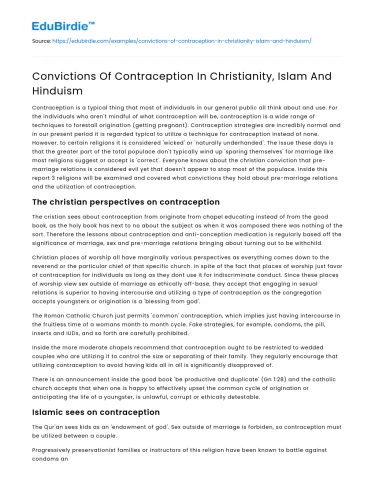Introduction
The use of contraception is a topic that has elicited a wide range of responses across different religious traditions. As an essential aspect of reproductive health, contraception holds significant implications for individuals and societies. Christianity, Islam, and Hinduism—three of the world's major religions—offer varied perspectives on this issue, shaped by doctrinal teachings, cultural contexts, and historical interpretations. Understanding these convictions not only provides insights into religious beliefs but also highlights the complex interplay between religion, ethics, and modernity. This essay explores the stances of Christianity, Islam, and Hinduism on contraception, examining the theological underpinnings, practical implications, and the evolving discourse within each tradition. By evaluating these religious views, we gain a nuanced appreciation of how faith communities navigate the challenges posed by contemporary reproductive technologies.
Christianity: A Spectrum of Beliefs
Christianity presents a diverse spectrum of beliefs regarding contraception, influenced by doctrinal interpretations and denominational differences. The Roman Catholic Church maintains a strong opposition to artificial contraception, as articulated in the 1968 encyclical Humanae Vitae by Pope Paul VI. This document emphasizes the sanctity of procreation and the natural law, arguing that artificial methods disrupt the divine purpose of human sexuality (Paul VI, 1968). The Catholic Church endorses Natural Family Planning (NFP) as a morally acceptable alternative, viewing it as a means to work within the natural reproductive cycle.
Save your time!
We can take care of your essay
- Proper editing and formatting
- Free revision, title page, and bibliography
- Flexible prices and money-back guarantee
In contrast, many Protestant denominations adopt a more liberal stance, permitting the use of contraceptives as a responsible exercise of family planning. The Anglican Church, for instance, recognized the moral acceptability of contraception at the Lambeth Conference in 1930, emphasizing the importance of informed conscience and marital responsibility. This diversity in Christian perspectives reflects the broader theological debates on human agency, morality, and the interpretation of scripture. While some Christians view contraception as a means to enhance marital intimacy and responsible parenting, others see it as contrary to divine will.
The debate within Christianity also extends to modern discussions around sexual ethics, with some theologians advocating for a more inclusive understanding of sexuality and reproduction. Critics of the Catholic position argue that a rigid stance on contraception may not adequately address contemporary challenges, such as overpopulation and public health concerns. This ongoing discourse reflects the dynamic nature of religious beliefs as they interact with changing societal norms and scientific advancements.
Islam: Balancing Tradition and Modernity
In Islam, the discourse on contraception is characterized by a balance between traditional teachings and contemporary realities. The Qur'an and Hadith do not explicitly prohibit the use of contraception, allowing for interpretative flexibility among Islamic scholars. Many Islamic jurists permit contraception, provided it does not cause harm and is consensual within marriage. The principle of maslahah (public interest) often guides these discussions, emphasizing the welfare of the family and society.
Islamic scholars such as Yusuf al-Qaradawi have argued that contraception can be permissible in situations where it serves a legitimate purpose, such as spacing births or protecting maternal health (Al-Qaradawi, 1997). The permissibility is often contingent upon specific conditions, such as ensuring that the method does not cause permanent sterility. This pragmatic approach allows Muslim communities to engage with contemporary reproductive technologies while adhering to religious principles.
However, opinions on contraception can vary significantly across different Islamic communities, influenced by cultural, regional, and sectarian factors. In some conservative contexts, contraception may be viewed with skepticism or disapproval, reflecting broader concerns about Western influence and moral values. Despite these variations, the overarching Islamic ethical framework prioritizes intention and context, allowing for a nuanced engagement with the issue.
Hinduism: Diverse Interpretations and Practices
Hinduism, with its diverse philosophical traditions and cultural practices, offers a wide range of perspectives on contraception. Unlike the more centralized doctrines of Christianity and Islam, Hindu beliefs are shaped by a multiplicity of texts, traditions, and societal norms. The absence of a singular religious authority allows for varied interpretations of reproductive ethics.
In Hindu thought, the concept of dharma (duty) plays a central role in ethical decision-making, including matters of family planning. Many Hindus view contraception as a means to fulfill one's dharma by ensuring the well-being of the family and society. The Hindu Marriage Act of 1955, which emphasizes responsible parenthood, reflects this pragmatic approach to family planning.
However, some Hindu texts and traditions emphasize procreation as a religious duty, particularly within the context of marriage. For instance, the Manusmriti underscores the importance of producing offspring to fulfill societal and ancestral obligations. These teachings can influence conservative attitudes towards contraception, particularly in rural and traditional communities.
The diversity within Hinduism allows for a pluralistic approach to contraception, accommodating a range of beliefs and practices. This flexibility enables Hindu communities to adapt to modern reproductive challenges while preserving cultural and religious values. As such, Hindu attitudes towards contraception often reflect a balance between traditional beliefs and contemporary needs.
Conclusion
The convictions of contraception within Christianity, Islam, and Hinduism reveal the complex interplay between religious doctrine, cultural context, and contemporary realities. While each tradition offers unique perspectives, they all grapple with the ethical implications of reproductive technologies and the need to balance religious principles with modern challenges. Christianity's diverse denominational views, Islam's pragmatic engagement with context, and Hinduism's pluralistic interpretations highlight the dynamic nature of religious beliefs.
As societies continue to evolve, these religious perspectives will likely adapt and transform, informed by ongoing theological debates and societal changes. Understanding these convictions not only enriches our appreciation of religious diversity but also underscores the importance of dialogue and engagement in addressing global reproductive health issues. By exploring the intersections of faith, ethics, and modernity, we gain valuable insights into the role of religion in shaping human experiences and aspirations.






 Stuck on your essay?
Stuck on your essay?

